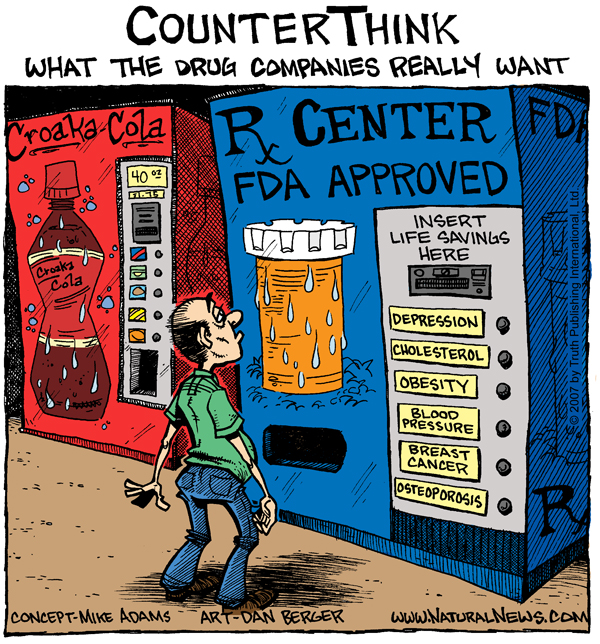Sometimes I would rather not bring light to these Quackery Watchers that think they are doing so much good. It seemed to be that pointing them out, gets them attention and the limelight which they so desperately want yet do not deserve. A few people die from overdoses on Ephedra, and so it was banned. What about the thousands and thousand who die from the drugs like aspirin and tylenol? Do they get banned? No, because the FDA and pharmaceutical companies have a nice little relationship built by lobbiest, with money as the backbone of the relationship.
1 person dies from chelation, should we ban chelation? How many people die from chemotherapy drugs and bypass surgeries each day and every year?
Fact is the Quackwatch Websites are funded by the pharmaceutical companies and the AMA who know that billions of dollars are spent on alternative medicine and preventative medicine. This upsets them, so they pay various Doctors to write an article slamming on alternative medicine and anyone who poses a threat to the wonderful drug cartel. Name 1 drug or 1 vaccine that does not have side effects, you cannot.
I agree that there are some snake oil salesman, but when these Quack Watch websites want to lump together ALL of the alternative medicines into 1 big pot, you have to question their intellect. After all, fact is, 50% of medical schools require 1 nutrition class. That is the fact, Look at the Medical School Curriculum, and you will see that they are funding heavily by the pharmaceutical companies.
Purdue University has a 500 level course called "Drugs from Nature" and the professor were Dr. Varro Tyler and Dr. James Robbers. These guys are highly recognized in pharmacognosy.
They told me that the course was no longer going to be offered in the future because the pharmaceutical companies that donates money to Purdue Universities School of Pharmacy put the pressure on to get to course dropped. Dr. Tyler is world recognized.
Somehow, people like Terry Polevoy ( the guy with the old computers below) and Stephen Barrett want to spend the lives defending pharmaceutical computers and making ANYTHING alternative as quackery.
Stephen Barrett ... In 1984, he received an FDA Commissioner's Special Citation Award for Public Service in fighting nutrition quackery.... Yawn ... GO FIGURE...
(1996): "Each year, use of NSAIDs (Non-Steroidal Anti-Inflammatory Drugs) accounts for an estimated 7,600 deaths and 76,000 hospitalizations in the United States." (NSAIDs include aspirin, ibuprofen, naproxen, diclofenac, ketoprofen, and tiaprofenic acid.) Source: Robyn Tamblyn, PhD; Laeora Berkson, MD, MHPE, FRCPC; W. Dale Jauphinee, MD, FRCPC; David Gayton, MD, PhD, FRCPC; Roland Grad, MD, MSc; Allen Huang, MD, FRCPC; Lisa Isaac, PhD; Peter McLeod, MD, FRCPC; and Linda Snell, MD, MHPE, FRCPC, "Unnecessary Prescribing of NSAIDs and the Management of NSAID-Related Gastropathy in Medical Practice," Annals of Internal Medicine (Washington, DC: American College of Physicians, 1997), September 15, 1997, 127:429-438, from the web at http://www.acponline.org/journals/annals/15sep97/nsaid.htm, last accessed Feb. 14, 2001, citing Fries, JF, "Assessing and understanding patient risk," Scandinavian Journal of Rheumatology Supplement, 1992;92:21-4.
(Average 1982-1998): According to Canadian researchers, approximately 32,000 hospitalized patients (and possibly as many as 106,000) in the USA die each year because of adverse reactions to their prescribed medications. Source: Lazarou, J, Pomeranz, BH, Corey, PN, "Incidence of adverse drug reactions in hospitalized patients: a meta-analysis of prospective studies," Journal of the American Medical Association (Chicago, IL: American Medical Association, 1998), 1998;279:1200-1205, also letters column, "Adverse Drug Reactions in Hospitalized Patients," JAMA (Chicago, IL: AMA, 1998), Nov. 25, 1998, Vol. 280, No. 20, from the web at http://jama.ama-assn.org/issues/v280n20/ffull/jlt1125-1.html, last accessed Feb. 12, 2001.


Proud man of drug medicine.
Facts are:
Dextromethorphan, the major ingredient in most OTC cough medicines, has been shown to cause birth defects and fetal death in chicken embryos exposed to concentrations relative to those typically taken by humans. Researchers found that dextromethorphan causes defects so early in the development of the embryo that in many cases the woman wouldn't even know she is pregnant. Reserachers feel that a single dose is capable of causing a birth defect and that, ultimately, it could be the cause for a woman to have a miscarriage.
Dextromethorphan suppresses cough by acting on receptors in the adult central nervous system. But in embryos, the drug appears to "knock out" the receptors, thus leading to the defects. Further study is needed, but in the meantime, the authors suggests that pregnant women or women attempting to get pregnant, be advised not to use dextromethorphan-containing cough medicine.
Doctors are the Third leading Cause of DeathMany of you reading this have read or seen this in many places other than my Web site. This article, available on my home page, was widely circulated on the Internet and was one of the reasons why my Web site was initially popular. What you may not realize is that I am the one who made this analysis and popularized it. The original study was published by Dr. Starfield, a full professor of public health at the most prestigious hospital in the United States, Johns Hopkins. Her study never had the headline in it, but instead listed the published research documenting the various causes of deaths that doctors contributed to. I simply added them all up and compared them to cardiovascular diseases and cancer and came up with the above headline, which was widely circulated on the Internet.
» Doctors May Be Third Leading Cause of Death Doctors Are The Third Leading Cause of Death in the US, Causing 250,000 Deaths Every Year This week's issue of the Journal of the American Medical Association (JAMA) is the best article I have ever seen written in the published literature documenting the tragedy of the traditional medical paradigm.
This information is a followup of the Institute of Medicine report which hit the papers in December of last year, but the data was hard to reference as it was not in peer-reviewed journal. Now it is published in JAMA which is the most widely circulated medical periodical in the world.
The author is Dr. Barbara Starfield of the Johns Hopkins School of Hygiene and Public Health and she describes how the US health care system may contribute to poor health.
ALL THESE ARE DEATHS PER YEAR:
- 12,000 — unnecessary surgery 8
- 7,000 — medication errors in hospitals 9
- 20,000 — other errors in hospitals 10
- 80,000 — infections in hospitals 10
- 106,000 — non-error, negative effects of drugs 2
- These total to 250,000 deaths per year from iatrogenic causes!!
What does the word iatrogenic mean? This term is defined as induced in a patient by a physician's activity, manner, or therapy. Used especially of a complication of treatment.
Dr. Starfield offers several warnings in interpreting these numbers:
- First, most of the data are derived from studies in hospitalized patients.
- Second, these estimates are for deaths only and do not include negative effects that are associated with disability or discomfort.
- Third, the estimates of death due to error are lower than those in the IOM report.
If the higher estimates are used, the deaths due to iatrogenic causes would range from 230,000 to 284,000. In any case, 225,000 deaths per year constitutes the third leading cause of death in the United States, after deaths from heart disease and cancer. Even if these figures are overestimated, there is a wide margin between these numbers of deaths and the next leading cause of death (cerebrovascular disease).
Another analysis (11) concluded that between 4% and 18% of consecutive patients experience negative effects in outpatient settings, with:
- 116 million extra physician visits
- 77 million extra prescriptions
- 17 million emergency department visits
- 8 million hospitalizations
- 3 million long-term admissions
- 199,000 additional deaths
- $77 billion in extra costs
The high cost of the health care system is considered to be a deficit, but seems to be tolerated under the assumption that better health results from more expensive care.
However, evidence from a few studies indicates that as many as 20% to 30% of patients receive inappropriate care.
An estimated 44,000 to 98,000 among them die each year as a result of medical errors.2
This might be tolerated if it resulted in better health, but does it? Of 13 countries in a recent comparison,3,4 the United States ranks an average of 12th (second from the bottom) for 16 available health indicators. More specifically, the ranking of the US on several indicators was:
- 13th (last) for low-birth-weight percentages
- 13th for neonatal mortality and infant mortality overall 14
- 11th for postneonatal mortality
- 13th for years of potential life lost (excluding external causes)
- 11th for life expectancy at 1 year for females, 12th for males
- 10th for life expectancy at 15 years for females, 12th for males
- 10th for life expectancy at 40 years for females, 9th for males
- 7th for life expectancy at 65 years for females, 7th for males
- 3rd for life expectancy at 80 years for females, 3rd for males
- 10th for age-adjusted mortality
The poor performance of the US was recently confirmed by a World Health Organization study, which used different data and ranked the United States as 15th among 25 industrialized countries.
There is a perception that the American public "behaves badly" by smoking, drinking, and perpetrating violence. However the data does not support this assertion.
- The proportion of females who smoke ranges from 14% in Japan to 41% in Denmark; in the United States, it is 24% (fifth best). For males, the range s from 26% in Sweden to 61% in Japan; it is 28% in the United States (third best).
- The US ranks fifth best for alcoholic beverage consumption.
- The US has relatively low consumption of animal fats (fifth lowest in men aged 55-64 years in 20 industrialized countries) and the third lowest mean cholesterol concentrations among men aged 50 to 70 years among 13 industrialized countries.
These estimates of death due to error are lower than those in a recent Institutes of Medicine report, and if the higher estimates are used, the deaths due to iatrogenic causes would range from 230,000 to 284,000.
Even at the lower estimate of 225,000 deaths per year, this constitutes the third leading cause of death in the US, following heart disease and cancer.
Lack of technology is certainly not a contributing factor to the US's low ranking.
- Among 29 countries, the United States is second only to Japan in the availability of magnetic resonance imaging units and computed tomography scanners per million population. 17
- Japan, however, ranks highest on health, whereas the US ranks among the lowest.
- It is possible that the high use of technology in Japan is limited to diagnostic technology not matched by high rates of treatment, whereas in the US, high use of diagnostic technology may be linked to more treatment.
- Supporting this possibility are data showing that the number of employees per bed (full-time equivalents) in the United States is highest among the countries ranked, whereas they are very low in Japan, far lower than can be accounted for by the common practice of having family members rather than hospital staff provide the amenities of hospital care.
Journal American Medical Association Vol 284 July 26, 2000


